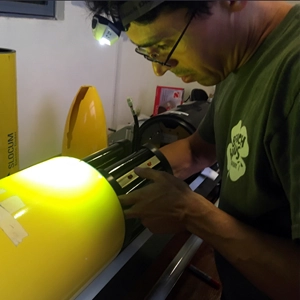
Glider and Marine Engineer
David Aragon
Research Interests
I have been helping RUCOOL with its research for over 10 years as the primary underwater glider pilot and technician. Initially I was involved with HF-Radar experimental antennas, maintenance of existing radar sites, and led new CODAR installations along Long Island and New Jersey. My educational background is in Electrical Engineering where I focused on robotics and computer graphics. Conducting research for RUCOOL has been rewarding, invigorating, and eye opening and looking to help it continue to grow and lead ocean observation across the globe.
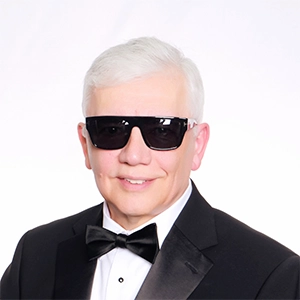
Research Programmer
Hernan Arango
Downloads:
Short Bio:
Hernan has been a Physical Oceanographer and Ocean Modeler at Rutgers University since September 1995. He is the lead developer of the Regional Ocean Modeling System (ROMS) and its ROMS-JEDI interface, part of the Joint Effort for Data Assimilation Integration (JEDI) Framework. This framework was created by colleagues at the Joint Center for Satellite Data Assimilation (JCSDA) in Boulder, Colorado. Over the years, ROMS has become more sophisticated and advanced, thanks to the contributions of various interdisciplinary scientific colleagues. ROMS is a community model in every sense, and its software is freely available at www.github.com/myroms. It has nearly 8,000 subscribed users worldwide, representing 120 countries.
I am fortunate to have a job that I truly love. I am curious, patient, and determined to develop and code complex physical and mathematical numerical models. I have also been privileged to work alongside extraordinary and talented colleagues I respect and admire. I strive to carry on the legacy of my early mentors, who inspired me during my graduate studies at Texas A&M University. From a young age, I have been drawn to both the ocean and computers, and it continues to amaze me that my passion for these interests remains as strong as ever.
In my free time, I enjoy astronomy, photography, traveling, admiring our planet, cooking, tasting fine wines, and reading a variety of genres
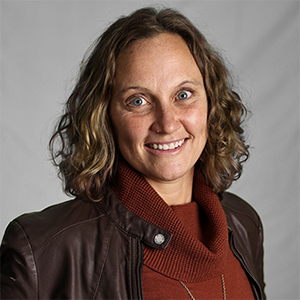
Executive Director – Megalopolitan Coastal Transformation Hub
Lisa Auermuller
Downloads:
Bio:
Lisa Auermuller serves as the Administrative Director of Rutgers’ NSF-funded Megalopolitan Coastal Transformation Hub (MACH). In this role, Lisa is the central manager of overall operations of the multi-institution effort. Lisa establishes mechanisms for collaborative sharing of findings among project partners, conducts regular outreach to promote coordination and collaboration with government agencies, and community leaders, and facilitates meaningful and routine collaboration and sharing among project partners.
Prior to 2023, Lisa was the Assistant Manager of the Jacques Cousteau National Estuarine Research Reserve (JC NERR) in Tuckerton, NJ where she had been employed since 2002. Lisa oversaw the day-to-day management of JC NERR’s Coastal Center as well as the Reserve’s education, outreach, communications, and Coastal Training Program.
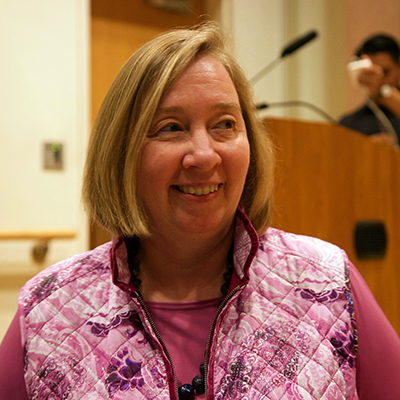
Senior Program Coordinator
Beatrice Birrer

Graduate Student Master of Operational Oceanography | Laboratory Researcher
Brian Buckingham
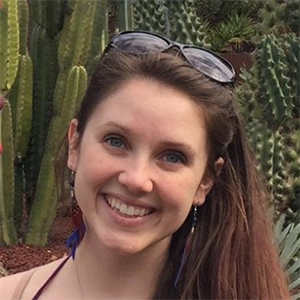
Research Project Manager
Kaycee Coleman
Research Interests
My current research interests focus on offshore wind farms, fish, fishing communities, and using Slocum gliders to study the ocean. My educational background is in Biological Oceanography. For an up to date CV please visit ResearchGate.
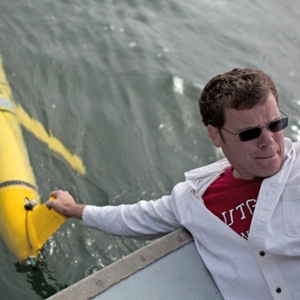
Technical Director: RUCOOL & MARACOOS
Michael Crowley
Downloads
Research Interests
Michael is the Technical Director for the Rutgers University Center for Ocean Observing Leadership (RUCOOL) and the Mid-Atlantic Regional Association Coastal Ocean Observing System (MARACOOS). His RUCOOL work includes: management of operations the entire COOL Lab, ensuring continuous quality data delivery from RUCOOL, and heading up the external communications for the RUCOOL Team including oversight of our website.
Michael is also the Technical Director for the U.S. Integrated Ocean Observing System (IOOS) MARACOOS. Michael oversees all aspects of data collection within the Mid-Atlantic Bight (Cape Hatteras to Cape Cod). MARACOOS collects data primarily from satellites, HF-RADAR and underwater ocean gliders. Data from all the instrumentation is used to feed and test ocean forecast models, with the ultimate goal being to better enable scientists to forecast both the ocean and atmospheric weather for the greater good of the Mid-Atlantic region. All of the data and much more can be viewed at oceansmap.maracoos.org.
Short History
1991 B.A. Geography, Rutgers University, New Brunswick, New Jersey.
1993 M.S. Geography/Oceanography, Rutgers University, New Brunswick New Jersey.
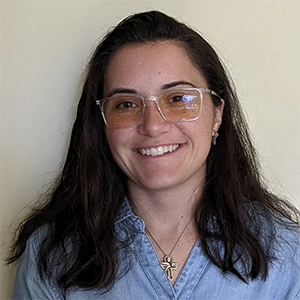
Laboratory Researcher
Julia Engdahl
Short History
I was part of the first cohort for the Master’s in Operational Oceanography at Rutgers University. During my time as a student, I became proficient in programming languages such as Python, MATLAB, and R in addition to the computer vision software, OpenCV, and machine learning algorithm, YOLOV3. I have used my coding expertise to analyze large physical oceanographic datasets. In June of 2020, I was hired as a federal contractor to support NOAA/NOS/CO-OPS to perform routine QA/QC procedures on water level and current meter data, generate historical high tide flooding statistics, and produce the annual high tide flooding outlook. My expertise in programming allowed me to innovate process automation, data visualizations, and to become a certified Software Carpentries Data Carpentries Instructor. All of which has led me back to Rutgers University – Center for Ocean Observing Leadership (RUCOOL) as a Laboratory Researcher where I will be working on the development of onboard processing capabilities for ocean gliders, including the processing of integrated current profiler data to deliver real time velocity measurements to shore. This effort will enable future use of real-time velocity profile data for use in oceanographic numerical modeling data assimilation and model evaluation, as well as making remote measurements of ocean currents and transport.
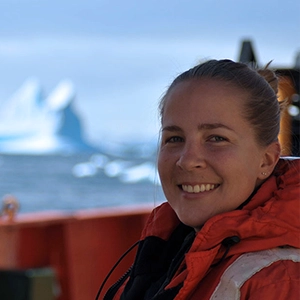
Laboratory Researcher
Lori Garzio
Downloads
Research Interests
I am the Laboratory Manager for the Saba Laboratory, which is part of the Center for Ocean Observing Leadership (COOL). My broad research interests include the long-term impacts of climate change on marine ecosystems and the ocean’s role in the global carbon cycle, particularly at high latitudes. I am specifically interested in the biological component of the carbon cycle, such as the spatial and temporal variability of primary production, how primary productivity is influenced by top-down and bottom-up processes, and the role of zooplankton in biogeochemical cycling and sequestration of carbon. In addition to my biological oceanography research interests, I also enjoy developing software programs (using Python) for data maintenance and quality control.
Short History
I received my M.S. in Marine Science in 2012 from the College of William & Mary at the Virginia Institute of Marine Science. For my thesis research, I investigated the microzooplankton community structure and grazing impact along the Western Antarctic Peninsula as part of the Palmer Antarctica Long-Term Ecological Research (PAL LTER) project. I went on to work as a data analyst in the pharmaceutical industry for several years where I gained experience in database management and data visualization before returning to my passion for oceanography research as part of the Center for Ocean Observing Leadership (COOL). From 2015 – 2018, I was part of the Data Evaluation team at Rutgers for the Ocean Observatories Initiative (OOI) where we assisted with the testing, deployment, and maintenance of the OOI Cyberinfrastructure system for data delivery to public users. I am now involved in various projects for the COOL group, including data analysis and visualization for wind energy assessment projects; real-time and delayed-mode glider data processing, QA/QC, analysis and visualization; and field and laboratory work for zooplankton ecology projects.
Select Publications
Steinberg DK, Ruck KE, Gleiber MR, Garzio LM, Cope JS, Bernard KS, Stammerjohn SE, Schofield OM, Quetin LB, Ross RM. 2015. Long-term (1993 – 2013) changes in macrozooplankton off the Western Antarctic Peninsula. Deep-Sea Research Part I 101:54-70.
Garzio LM, Steinberg DK, Erickson M, and HW Ducklow. 2013. Microzooplankton grazing along the Western Antarctic Peninsula. Aquatic Microbial Ecology 70:215-232.
Garzio LM, and DK Steinberg. 2013. Microzooplankton community structure along the Western Antarctic Peninsula. Deep-Sea Research Part I 77:36-49.
Sailley SF, Ducklow HW, Moeller HV, Fraser W, Schofield OM, Steinberg DK, Garzio LM, and SC Doney. 2013. Carbon fluxes and pelagic ecosystem dynamics near two western Antarctic Peninsula Adélie penguin colonies: an inverse model approach. Marine Ecology Progress Series, 492: 253-272.
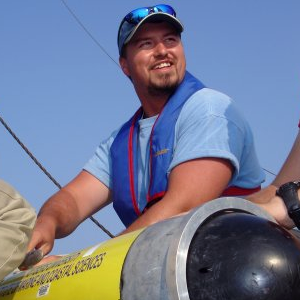
Director of Marine Operations, R/V Captain
Chip Haldeman
Research Interests
The physical aspects tend to pique my interest the most – waves, currents, tides, and the motion of the ocean. Specific interests include the physical coupling of the ocean and atmosphere, and the effects that the ocean has on weather. I’ve spent a large part of my career collecting and analyzing glider data in an attempt to provide more data for models to assimilate, hoping to significantly improve forecasting. I do, however, find smaller scale phenomena just as interesting – a tidal jet approaching an ideal laminar flow showing up in the ADCP data we’re collecting will have me as excited as a kid in a candy store.
Short History
Whether it’s work or play, the ocean is my forte. Growing up in NJ I spent a lot of time on the ocean, but going to school in New Mexico, I had a very limited view of what oceanography actually was. Attending Rutgers broadened my horizons significantly, and I joined COOL as an undergrad. Bringing with me a significant set of hands-on skills and seamanship, I filled a specific niche and was able to forge a path all my own that has blossomed into an incredible career. From building and designing moored instrumentation arrays, to CODAR technician, to glider pilot and technician, to scientific research diver, and now research vessel captain, it has all been very fulfilling. I am a Rutgers “lifer”, and I now enjoy imparting that knowledge to the next crop of scientists and technicians that come through RUCOOL.
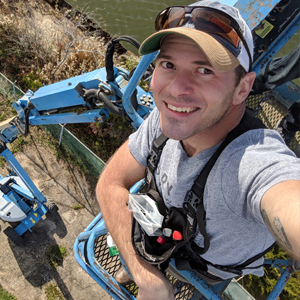
Lead HF-Radar Operator
Ethan Handel
Downloads
Research Interests
I am a research project coordinator with RUCOOL, and I primarily specialize in operational oceanography. Specifically, I have been working to support NOAA’s IOOS program as the lead HF-radar operator for the Mid-Atlantic region. I am responsible for the installations, operations, maintenance, and enhancement of 20 different coastal research stations. My time is divided between working on science and engineering data analysis, collection, and aggregation, from RUCOOL’s operations center at Rutgers University and conducting fieldwork at the shore. I help assist faculty, post-docs, grad students, and undergrads who need to work with the data collected by our HF-radar systems. This data is used to make near-real-time maps of the coastal ocean surface currents, which gets used to help improve the U.S Coast Guard’s Search and Rescue operations.
Short History
I graduated from Rutgers University in 2008 with a degree in Applied Ecology and Natural Resources Management. Having spent time as an undergraduate assisting the RUCOOL group in a variety of roles, I began working full-time with RUCOOL after completing my Bachelors program.
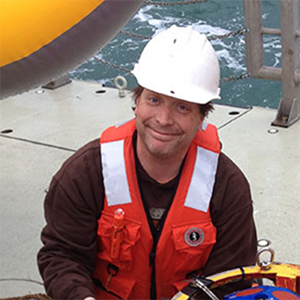
Marine Scientist II
Eli Hunter
Research Interests
- Coastal and estuarine physical processes.
- Modeling of coastal ocean dynamics.
- Real-time data assimilation for ocean forecasting.
- Small scale turbulence measurements in the field and laboratory
- Lagrangian measurements and processes.
Short History
I earned a degree in Physics from Rensselaer Polytechnic Institute in 1992, after which I spent 5 years as a quality control chemist in the electronics gas industry. In the Fall of 1999, I returned to school at the College of Marine Studies at the University of Delaware. In the Spring of 2001, I was awarded an M.S. in Physical Ocean Science and engineering and was brought on at Rutgers University as a technician.
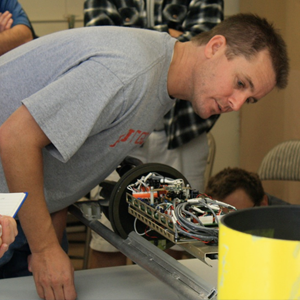
Lead Software Developer
John Kerfoot
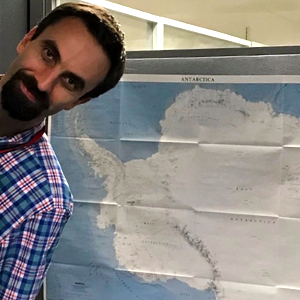
Web Design, Programmer, Education
Sage Lichtenwalner
Short History
Sage works with scientists to translate their research results and data into online and offline products that can be used by K-16 students, teachers and the general public. Sage is a research programmer who concentrates on product management, design, and database driven web development. He has over a decade of experience designing and developing interactive web applications and data visualization tools that communicate cutting edge research in accessible ways. Sage has a B.S. in Physics from Rutgers University and a M.B.S. in User Experience Design.
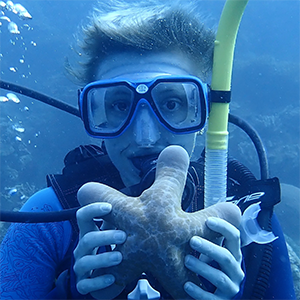
Research Program Coordinator
- DMCS
Delphine Mossman
Downloads
Research Interests
My research interests are multidisciplinary and manyfold. With the work I am doing with RUCOOL, I am interested in the effectiveness of glider-mounted echosounders as a supplement or even a replacement to conventional vessel-based zooplankton sampling, and anthropogenic impact on the ocean. I am also interested in cetacean communication and conservation, and the impact of noise pollution on ocean ecosystems.
Short History
I have harbored an intense love of and fascination with the ocean for as long as I can remember, fueled mainly by summer camps and trips to the shores of Stone Harbor, NJ. To that end, I attended Stony Brook University on Long Island for my undergraduate years and received bachelor’s degrees in Marine Vertebrate Biology and Applied Math & Statistics. Just prior to graduating, I exchanged emails with Dr. Kim Davies of the University of New Brunswick, and we agreed that her research on a glider-mounted echosounder was the perfect fit for my graduate-level research interests. I received with my MSc in Biology in August of 2022, and am now working full-time for Rutgers University on glider-echosounder evaluation projects.
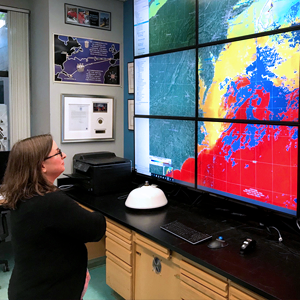
Data Analyst and Programmer
Laura Nazzaro
Downloads
Research Interests
I am a research programmer involved in various projects for the COOL lab. My main focus lies in how features of the physical environment relate to biological patterns and trends, both on short and long time scales. Many of my projects use remotely sensed data and modeled projections to better understand patterns in mid-Atlantic fisheries indices, and some of these results have been included in stock assessments for certain species. I also contribute software and analysis of remotely sensed data from gliders, HF radar, and satellites to other projects involving storm forecasting, seabreeze and offshore wind energy, creation of climatologies, and quality control of data.
Short History
In 2008 I graduated from The College of New Jersey with a degree in biology focused in ecology, and began working towards a masters degree at Rutgers. My thesis aimed to identify how various physical features of the environment, such as temperature and surface currents, correlate with fish abundance and distribution patterns in the Mid-Atlantic Bight. I have continued working on various projects within the COOL lab since graduating in early 2011.
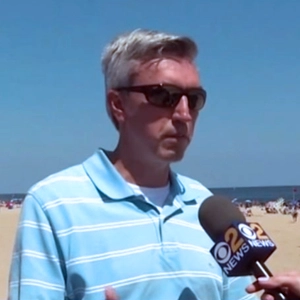
Director of CODAR
Hugh Roarty
Downloads
Research Interests
Hugh Roarty is an award winning speaker and recipient of the John P. Breslin Award for outstanding research in ocean engineering. He is currently a Research Project Manager with the Center for Ocean Observing Leadership at Rutgers University. His research interests focus on improving the remote sensing and in situ instrumentation used to measure the physical and biological aspects of the ocean. This instrumentation includes High Frequency (HF) radar systems, autonomous under water vehicles (AUVs), and acoustic velocity meters. He has used HF radar systems for the measurement of ocean surface currents and wave parameters. He has applied these measurements for use in Coast Guard search and rescue exercises, the study of river discharge plumes and prediction of coastal inundation during storm events. He also developed the dual use capability of the HF radar for environmental monitoring and target detection. This work was performed within the National Center for Secure and Resilient Maritime Commerce (CSR). His graduate research focused on coastal processes and bottom boundary layer dynamics.
Short History
2001 Ph.D. Ocean Engineering, Stevens Institute of Technology, Hoboken, New Jersey, USA
1998 M.S. Ocean Engineering, Stevens Institute of Technology, Hoboken, New Jersey, USA
1995 B.S. Civil Engineering, Rutgers College of Engineering, New Brunswick, New Jersey, USA
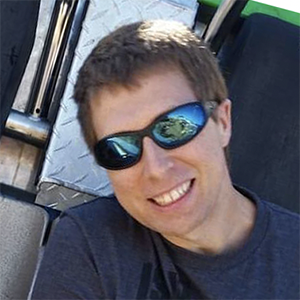
Research Programmer
David Robertson
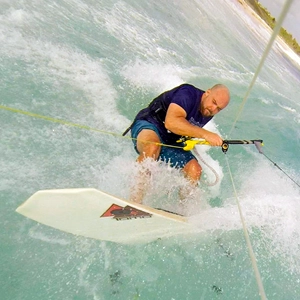
Data Analyst and Programmer
Mike Smith
Downloads
Research Interests
Mike is a graduate of Rutgers University in 2009 with a BS in Biological Sciences. He has worked full-time as a research analyst in the Center for Ocean Observing Leadership (COOL) since 2009 and has experience on a variety of projects utilizing most of the oceanographic sensors operated by the lab. One of his primary focus over the past eight years has been quality control (QC) and visualization of the data products derived from CODAR SeaSonde High Frequency (HF) radar. He has been maintaining the real-time data processing of HF radar radial data into surface current vectors for the Mid-Atlantic, Antarctic, and Puerto Rico regions. He has also developed a python toolbox that reads in HF Radar files, runs a variety of QC tests, and outputs the data into multiple formats: MySQL, NetCDF, and LLUV format. Additionally, he was also heavily involved in the development of an algorithm that utilizes HF radar data to detect ships beyond the horizon. Over the past four years, Mike has been assessing the quality of mobile and stationary assets for the Endurance Array of NSF funded Ocean Observatories Initiative (OOI) project nearly full-time.
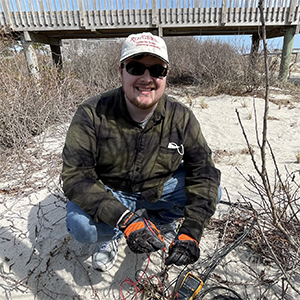
Laboratory Researcher
Timothy Stolarz
Understanding Ocean Highways: Trends in Surface Current Divergence in Urbanized Coastal Margins for a Predictable Ocean
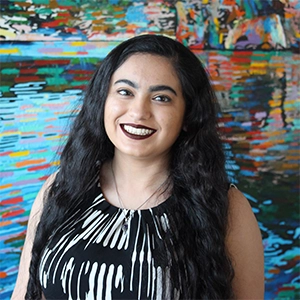
Research Project Assistant
Mitaali Taskar
Short Bio:
Born and raised in New Jersey, I have always been interested in fostering the curiosity all of us possess; I work with various communities to create and maintain meaningful science outreach and education networks.
I earned a B.Sc. Biology from McGill University, devoting much of my time with local science outreach initiatives and organizations. It was there that I planned on studying how informal science outreach works with formal science education to impact how every person perceives and values the scientific field.
Then, I served as a Public Ally through an Americorps Service Project, working as an alternative science educator in Colorado. Developing my own curricula through a historically responsive lens, I emphasized critical thinking and asking weird questions earnestly.
After this, I gained a M.S.Com. (Master of Science Communication) from Laurentian University. Connected with a leading science center, I examined how we can systematically evaluate the meaningful impacts of science outreach efforts.
After all this travel, I am thankful to return home, eager to apply my work at Rutgers University.
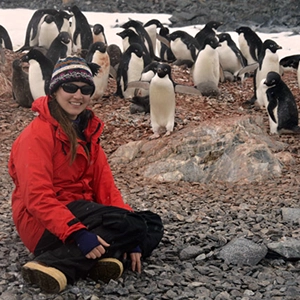
Laboratory Researcher
Nicole Waite
Downloads
Research Interests
Broadly, I am interested in coastal marine ecosystems, with a particular interest in how the chemistry and biology of these environments are interrelated. A main driver of my research interests is how humans are connected to, impact, and depend on the oceans. I am interested in research that focuses for example on climate change, ecosystem health of important resources, and eutrophication. Currently, my research focuses on phytoplankton ecology along the Western Antarctic Peninsula, one of the most rapidly warming places on Earth. I am also a part of the Center of Ocean Observing Leadership (COOL), where I help deploy our fleet of gliders (autonomous underwater vehicles). Outside of research, I’m also very interested in education and outreach. I think it is so important to involve non-scientists in the work we do to not only share why it is important and matters to them but to get them interested and excited about the oceans in general. Whenever I can, I love to help out our outreach team when opportunities arise.
Short History
I’ve always loved the ocean and have been studying oceanography since high school, where I competed in the National Ocean Sciences Bowl. I received my Bachelor’s degree from the University of New England, with a major in Marine Biology and a minor in Chemistry. After that, I spent a year working in a marine benthic ecology lab at the Dauphin Island Sea Lab, Alabama with Dr. Ken Heck. My research there focused on near-shore oyster reefs and seagrasses. I completed my Master’s degree in Oceanography at Rutgers with Dr. Silke Severmann. My thesis research focused on how sedimentary sulfide and iron is impacted by eutrophication and how that in turn affects seagrass health. Upon completion of my Master’s degree, I remained working in coastal ecosystems, but I made a big jump from the coasts of New Jersey to the coasts of Antarctica and began working as a Lab Researcher for Dr. Oscar Schofield and the COOL group.
